Criminal Justice: Deterrence, Punishment, and Impulsivity Analysis
VerifiedAdded on 2020/05/08
|11
|3326
|68
Essay
AI Summary
This essay delves into the central concept of deterrence within the realm of criminal justice. It begins by defining deterrence as a mechanism to discourage criminal activities through the threat of serious consequences, tracing its historical roots from ancient times to its contemporary application. The essay then presents a comparative analysis of two distinct deterrence ideas: the theory of punishment and impulsivity. The theory of punishment is discussed in relation to how the justice system applies it and the impact on crime reduction. It also explores how impulsivity, as a factor in criminal behavior, challenges the effectiveness of traditional deterrence methods. The essay highlights the complexities of deterrence, examining whether punishment and impulsivity are effective methods for preventing crime. The essay concludes by discussing the limitations of punishment, especially in the context of impulsive criminals, and the need for alternative strategies in the criminal justice system.
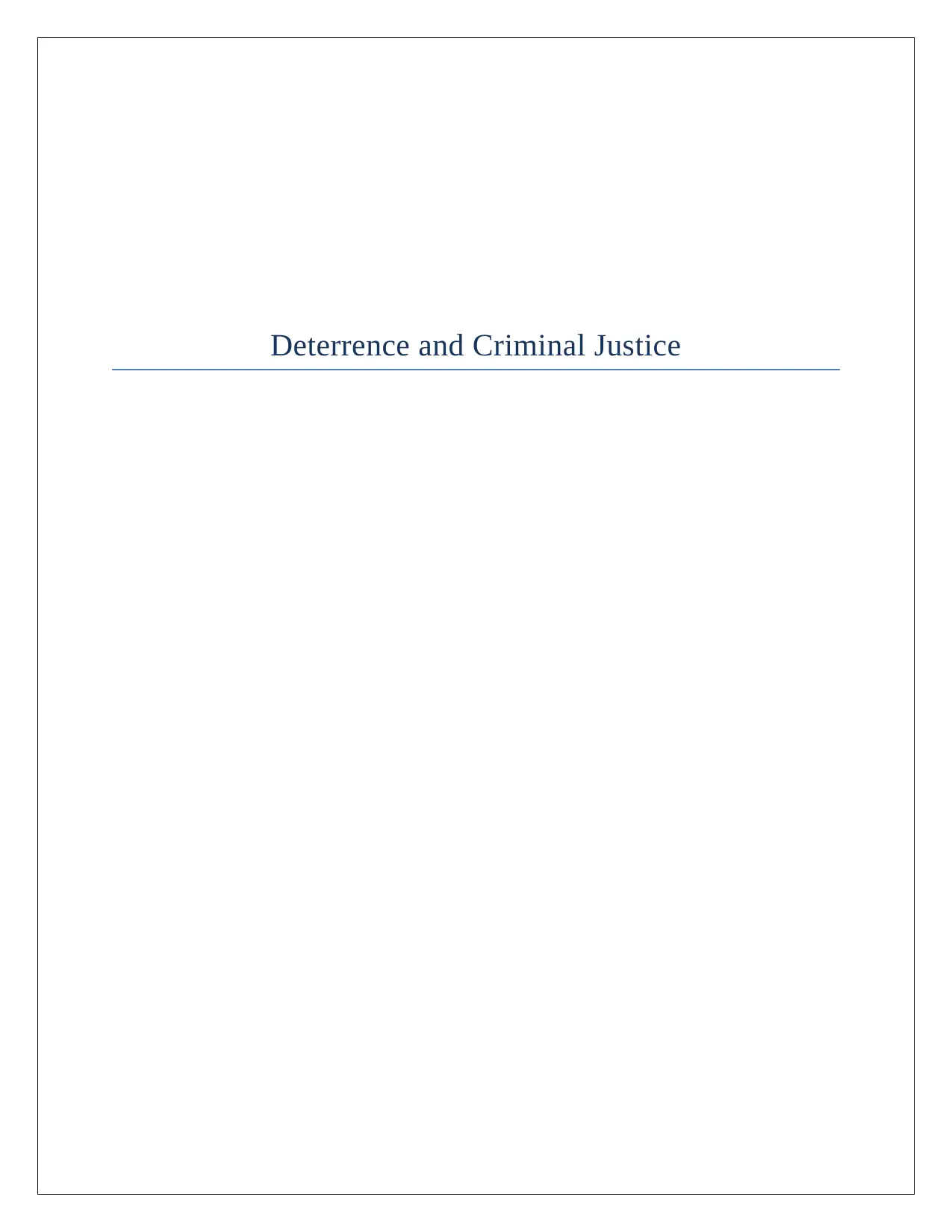
Deterrence and Criminal Justice
Paraphrase This Document
Need a fresh take? Get an instant paraphrase of this document with our AI Paraphraser
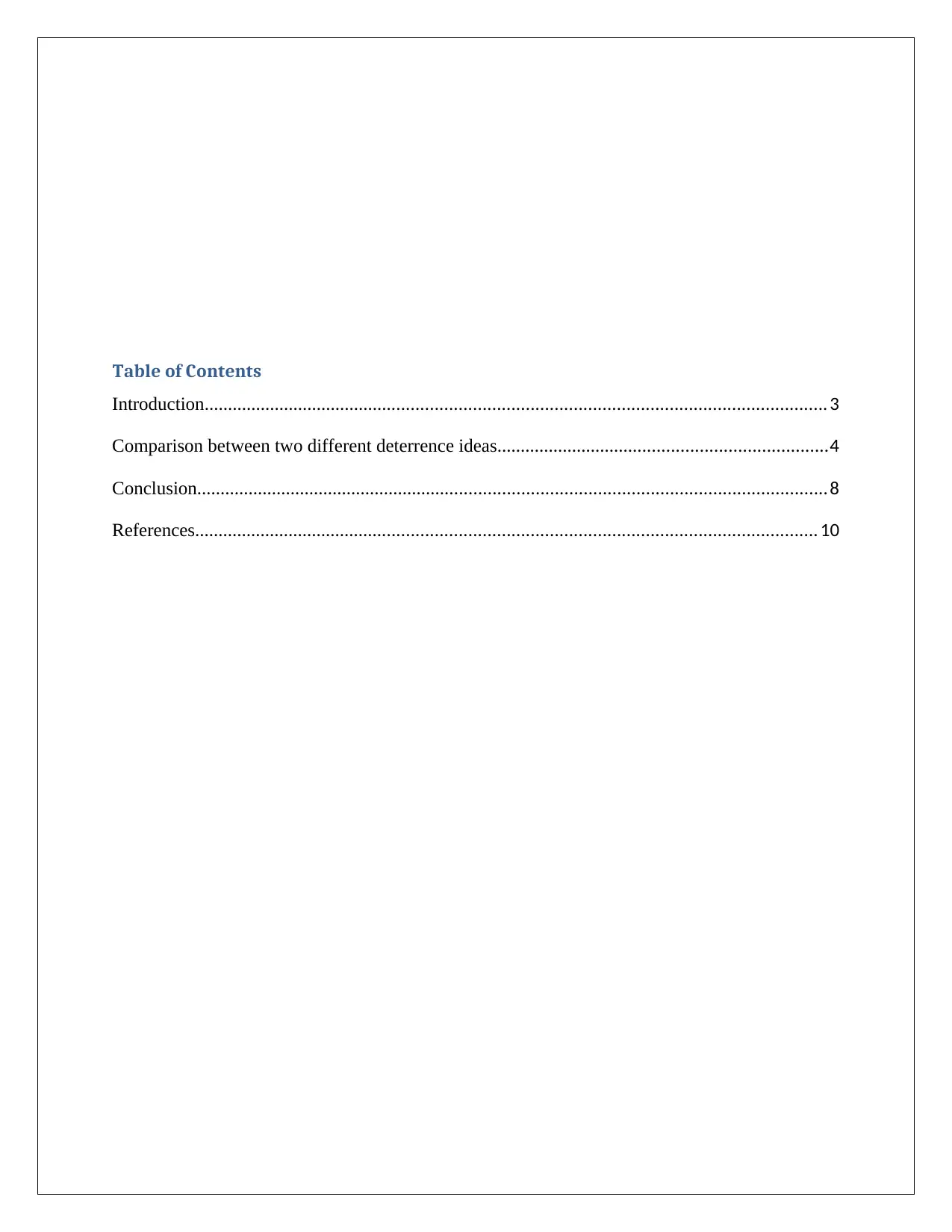
Table of Contents
Introduction................................................................................................................................... 3
Comparison between two different deterrence ideas......................................................................4
Conclusion..................................................................................................................................... 8
References................................................................................................................................... 10
Introduction................................................................................................................................... 3
Comparison between two different deterrence ideas......................................................................4
Conclusion..................................................................................................................................... 8
References................................................................................................................................... 10
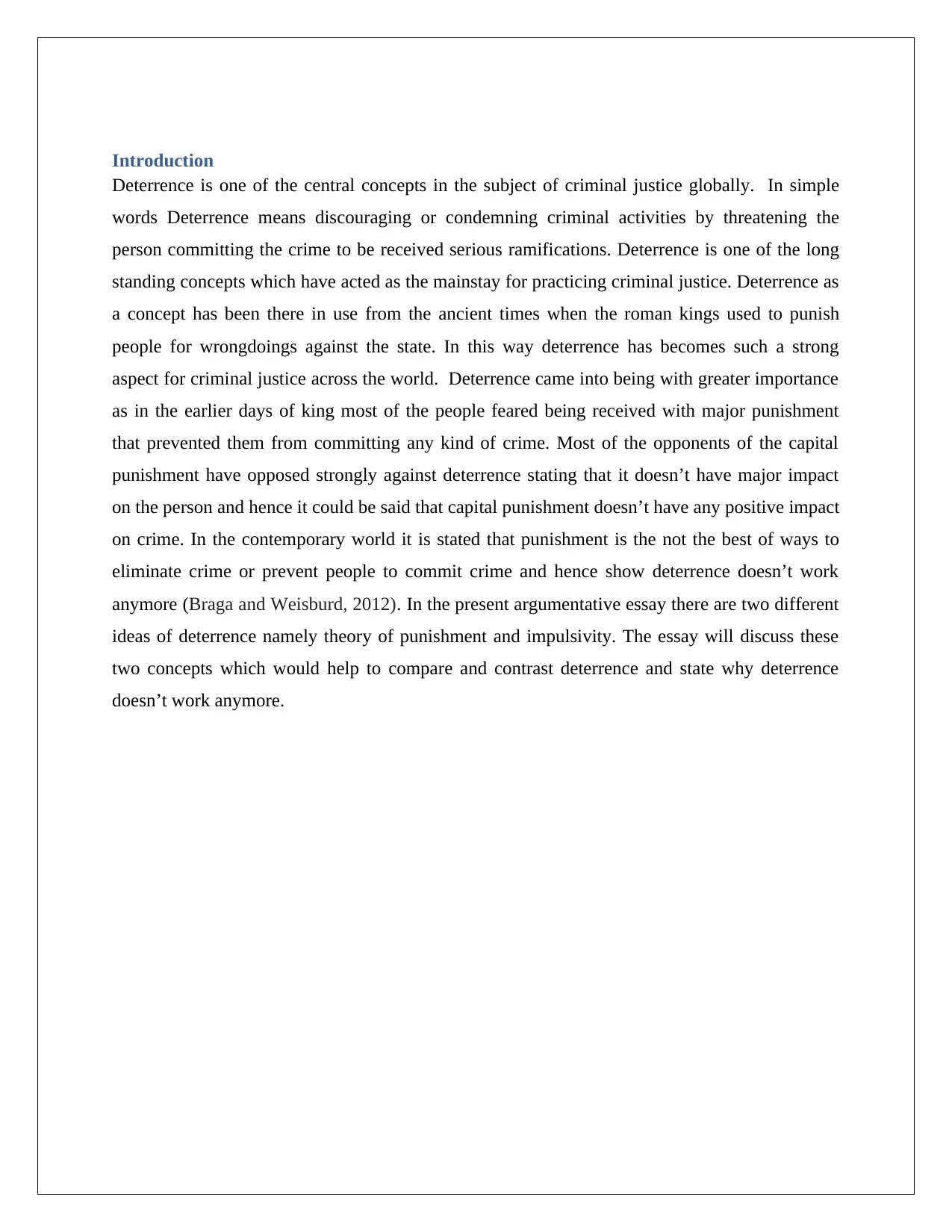
Introduction
Deterrence is one of the central concepts in the subject of criminal justice globally. In simple
words Deterrence means discouraging or condemning criminal activities by threatening the
person committing the crime to be received serious ramifications. Deterrence is one of the long
standing concepts which have acted as the mainstay for practicing criminal justice. Deterrence as
a concept has been there in use from the ancient times when the roman kings used to punish
people for wrongdoings against the state. In this way deterrence has becomes such a strong
aspect for criminal justice across the world. Deterrence came into being with greater importance
as in the earlier days of king most of the people feared being received with major punishment
that prevented them from committing any kind of crime. Most of the opponents of the capital
punishment have opposed strongly against deterrence stating that it doesn’t have major impact
on the person and hence it could be said that capital punishment doesn’t have any positive impact
on crime. In the contemporary world it is stated that punishment is the not the best of ways to
eliminate crime or prevent people to commit crime and hence show deterrence doesn’t work
anymore (Braga and Weisburd, 2012). In the present argumentative essay there are two different
ideas of deterrence namely theory of punishment and impulsivity. The essay will discuss these
two concepts which would help to compare and contrast deterrence and state why deterrence
doesn’t work anymore.
Deterrence is one of the central concepts in the subject of criminal justice globally. In simple
words Deterrence means discouraging or condemning criminal activities by threatening the
person committing the crime to be received serious ramifications. Deterrence is one of the long
standing concepts which have acted as the mainstay for practicing criminal justice. Deterrence as
a concept has been there in use from the ancient times when the roman kings used to punish
people for wrongdoings against the state. In this way deterrence has becomes such a strong
aspect for criminal justice across the world. Deterrence came into being with greater importance
as in the earlier days of king most of the people feared being received with major punishment
that prevented them from committing any kind of crime. Most of the opponents of the capital
punishment have opposed strongly against deterrence stating that it doesn’t have major impact
on the person and hence it could be said that capital punishment doesn’t have any positive impact
on crime. In the contemporary world it is stated that punishment is the not the best of ways to
eliminate crime or prevent people to commit crime and hence show deterrence doesn’t work
anymore (Braga and Weisburd, 2012). In the present argumentative essay there are two different
ideas of deterrence namely theory of punishment and impulsivity. The essay will discuss these
two concepts which would help to compare and contrast deterrence and state why deterrence
doesn’t work anymore.
⊘ This is a preview!⊘
Do you want full access?
Subscribe today to unlock all pages.

Trusted by 1+ million students worldwide
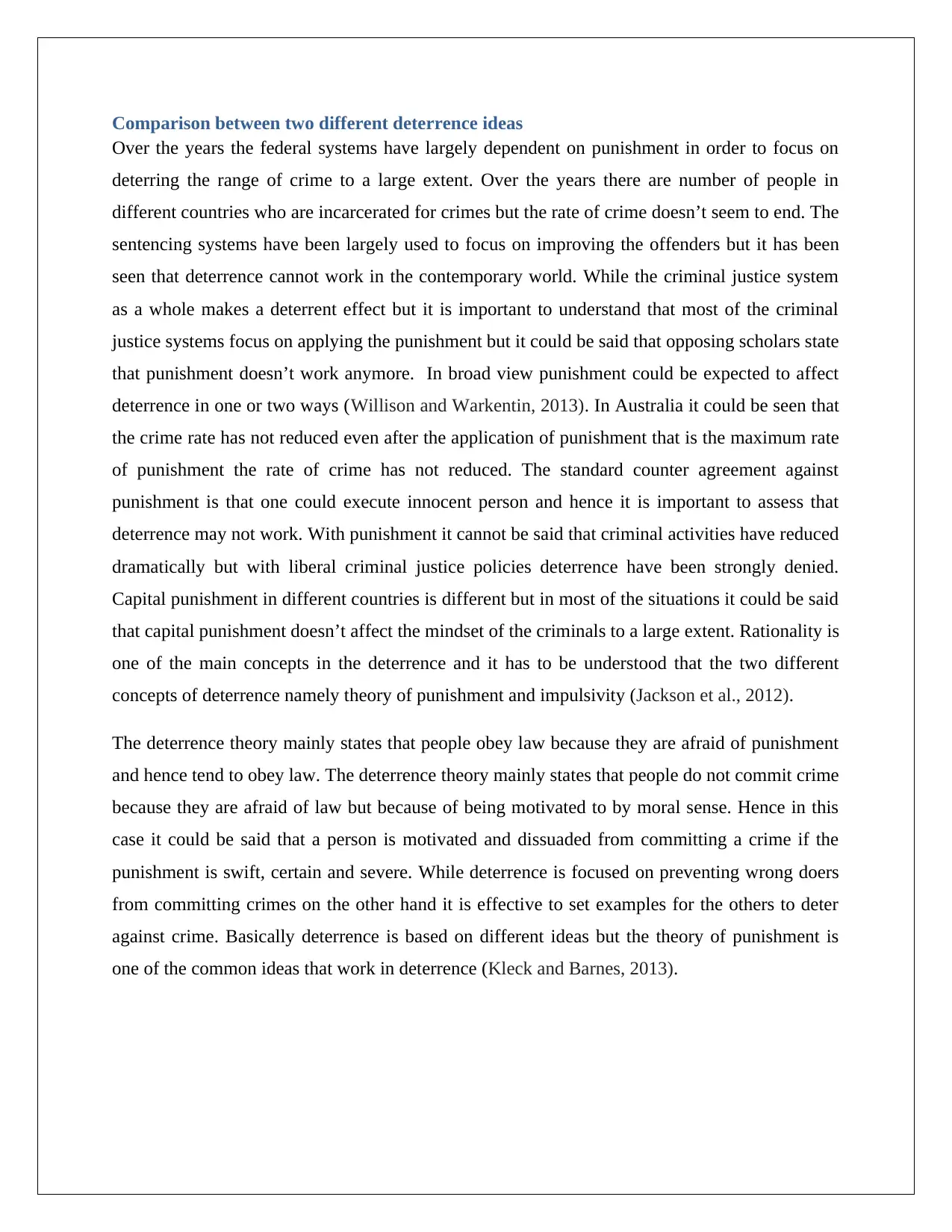
Comparison between two different deterrence ideas
Over the years the federal systems have largely dependent on punishment in order to focus on
deterring the range of crime to a large extent. Over the years there are number of people in
different countries who are incarcerated for crimes but the rate of crime doesn’t seem to end. The
sentencing systems have been largely used to focus on improving the offenders but it has been
seen that deterrence cannot work in the contemporary world. While the criminal justice system
as a whole makes a deterrent effect but it is important to understand that most of the criminal
justice systems focus on applying the punishment but it could be said that opposing scholars state
that punishment doesn’t work anymore. In broad view punishment could be expected to affect
deterrence in one or two ways (Willison and Warkentin, 2013). In Australia it could be seen that
the crime rate has not reduced even after the application of punishment that is the maximum rate
of punishment the rate of crime has not reduced. The standard counter agreement against
punishment is that one could execute innocent person and hence it is important to assess that
deterrence may not work. With punishment it cannot be said that criminal activities have reduced
dramatically but with liberal criminal justice policies deterrence have been strongly denied.
Capital punishment in different countries is different but in most of the situations it could be said
that capital punishment doesn’t affect the mindset of the criminals to a large extent. Rationality is
one of the main concepts in the deterrence and it has to be understood that the two different
concepts of deterrence namely theory of punishment and impulsivity (Jackson et al., 2012).
The deterrence theory mainly states that people obey law because they are afraid of punishment
and hence tend to obey law. The deterrence theory mainly states that people do not commit crime
because they are afraid of law but because of being motivated to by moral sense. Hence in this
case it could be said that a person is motivated and dissuaded from committing a crime if the
punishment is swift, certain and severe. While deterrence is focused on preventing wrong doers
from committing crimes on the other hand it is effective to set examples for the others to deter
against crime. Basically deterrence is based on different ideas but the theory of punishment is
one of the common ideas that work in deterrence (Kleck and Barnes, 2013).
Over the years the federal systems have largely dependent on punishment in order to focus on
deterring the range of crime to a large extent. Over the years there are number of people in
different countries who are incarcerated for crimes but the rate of crime doesn’t seem to end. The
sentencing systems have been largely used to focus on improving the offenders but it has been
seen that deterrence cannot work in the contemporary world. While the criminal justice system
as a whole makes a deterrent effect but it is important to understand that most of the criminal
justice systems focus on applying the punishment but it could be said that opposing scholars state
that punishment doesn’t work anymore. In broad view punishment could be expected to affect
deterrence in one or two ways (Willison and Warkentin, 2013). In Australia it could be seen that
the crime rate has not reduced even after the application of punishment that is the maximum rate
of punishment the rate of crime has not reduced. The standard counter agreement against
punishment is that one could execute innocent person and hence it is important to assess that
deterrence may not work. With punishment it cannot be said that criminal activities have reduced
dramatically but with liberal criminal justice policies deterrence have been strongly denied.
Capital punishment in different countries is different but in most of the situations it could be said
that capital punishment doesn’t affect the mindset of the criminals to a large extent. Rationality is
one of the main concepts in the deterrence and it has to be understood that the two different
concepts of deterrence namely theory of punishment and impulsivity (Jackson et al., 2012).
The deterrence theory mainly states that people obey law because they are afraid of punishment
and hence tend to obey law. The deterrence theory mainly states that people do not commit crime
because they are afraid of law but because of being motivated to by moral sense. Hence in this
case it could be said that a person is motivated and dissuaded from committing a crime if the
punishment is swift, certain and severe. While deterrence is focused on preventing wrong doers
from committing crimes on the other hand it is effective to set examples for the others to deter
against crime. Basically deterrence is based on different ideas but the theory of punishment is
one of the common ideas that work in deterrence (Kleck and Barnes, 2013).
Paraphrase This Document
Need a fresh take? Get an instant paraphrase of this document with our AI Paraphraser
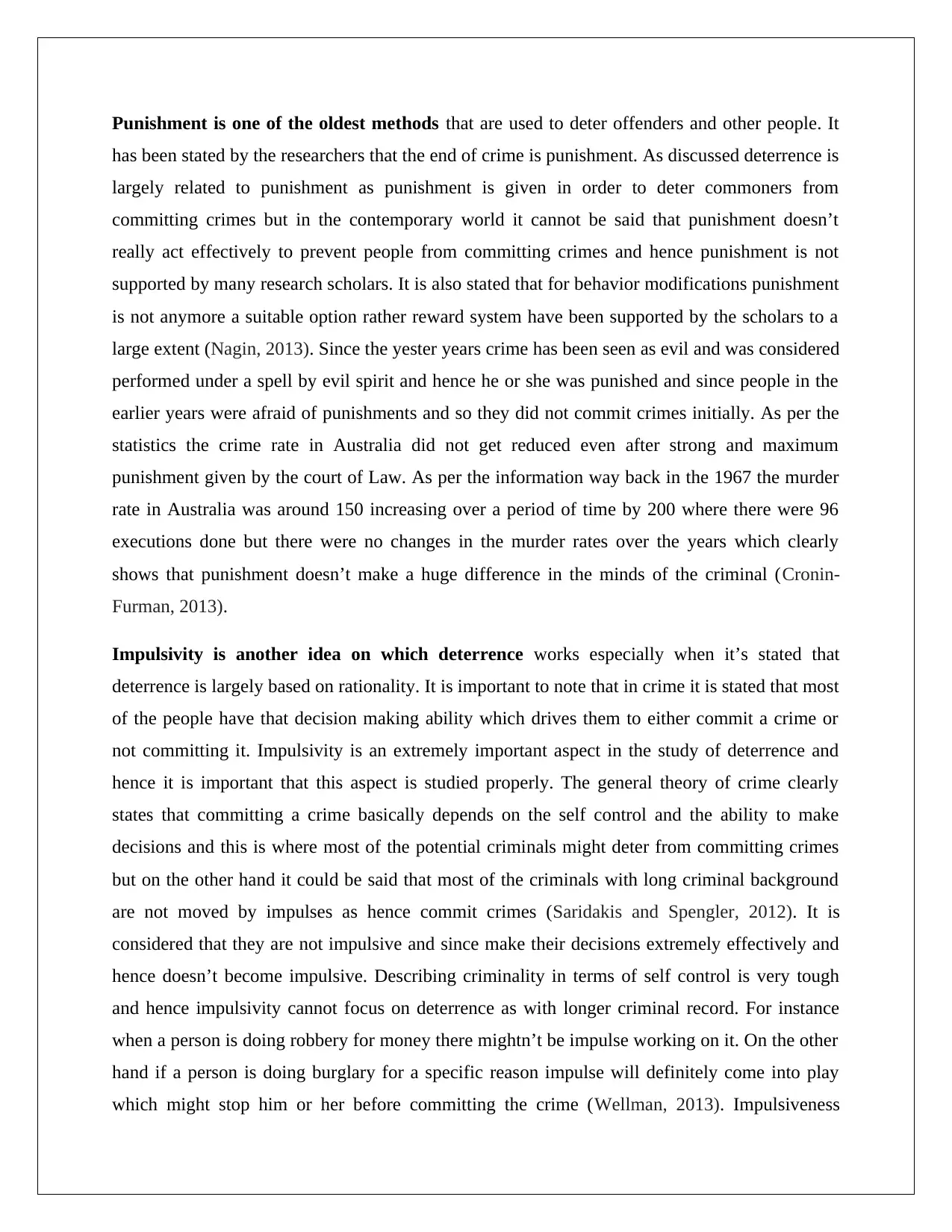
Punishment is one of the oldest methods that are used to deter offenders and other people. It
has been stated by the researchers that the end of crime is punishment. As discussed deterrence is
largely related to punishment as punishment is given in order to deter commoners from
committing crimes but in the contemporary world it cannot be said that punishment doesn’t
really act effectively to prevent people from committing crimes and hence punishment is not
supported by many research scholars. It is also stated that for behavior modifications punishment
is not anymore a suitable option rather reward system have been supported by the scholars to a
large extent (Nagin, 2013). Since the yester years crime has been seen as evil and was considered
performed under a spell by evil spirit and hence he or she was punished and since people in the
earlier years were afraid of punishments and so they did not commit crimes initially. As per the
statistics the crime rate in Australia did not get reduced even after strong and maximum
punishment given by the court of Law. As per the information way back in the 1967 the murder
rate in Australia was around 150 increasing over a period of time by 200 where there were 96
executions done but there were no changes in the murder rates over the years which clearly
shows that punishment doesn’t make a huge difference in the minds of the criminal (Cronin-
Furman, 2013).
Impulsivity is another idea on which deterrence works especially when it’s stated that
deterrence is largely based on rationality. It is important to note that in crime it is stated that most
of the people have that decision making ability which drives them to either commit a crime or
not committing it. Impulsivity is an extremely important aspect in the study of deterrence and
hence it is important that this aspect is studied properly. The general theory of crime clearly
states that committing a crime basically depends on the self control and the ability to make
decisions and this is where most of the potential criminals might deter from committing crimes
but on the other hand it could be said that most of the criminals with long criminal background
are not moved by impulses as hence commit crimes (Saridakis and Spengler, 2012). It is
considered that they are not impulsive and since make their decisions extremely effectively and
hence doesn’t become impulsive. Describing criminality in terms of self control is very tough
and hence impulsivity cannot focus on deterrence as with longer criminal record. For instance
when a person is doing robbery for money there mightn’t be impulse working on it. On the other
hand if a person is doing burglary for a specific reason impulse will definitely come into play
which might stop him or her before committing the crime (Wellman, 2013). Impulsiveness
has been stated by the researchers that the end of crime is punishment. As discussed deterrence is
largely related to punishment as punishment is given in order to deter commoners from
committing crimes but in the contemporary world it cannot be said that punishment doesn’t
really act effectively to prevent people from committing crimes and hence punishment is not
supported by many research scholars. It is also stated that for behavior modifications punishment
is not anymore a suitable option rather reward system have been supported by the scholars to a
large extent (Nagin, 2013). Since the yester years crime has been seen as evil and was considered
performed under a spell by evil spirit and hence he or she was punished and since people in the
earlier years were afraid of punishments and so they did not commit crimes initially. As per the
statistics the crime rate in Australia did not get reduced even after strong and maximum
punishment given by the court of Law. As per the information way back in the 1967 the murder
rate in Australia was around 150 increasing over a period of time by 200 where there were 96
executions done but there were no changes in the murder rates over the years which clearly
shows that punishment doesn’t make a huge difference in the minds of the criminal (Cronin-
Furman, 2013).
Impulsivity is another idea on which deterrence works especially when it’s stated that
deterrence is largely based on rationality. It is important to note that in crime it is stated that most
of the people have that decision making ability which drives them to either commit a crime or
not committing it. Impulsivity is an extremely important aspect in the study of deterrence and
hence it is important that this aspect is studied properly. The general theory of crime clearly
states that committing a crime basically depends on the self control and the ability to make
decisions and this is where most of the potential criminals might deter from committing crimes
but on the other hand it could be said that most of the criminals with long criminal background
are not moved by impulses as hence commit crimes (Saridakis and Spengler, 2012). It is
considered that they are not impulsive and since make their decisions extremely effectively and
hence doesn’t become impulsive. Describing criminality in terms of self control is very tough
and hence impulsivity cannot focus on deterrence as with longer criminal record. For instance
when a person is doing robbery for money there mightn’t be impulse working on it. On the other
hand if a person is doing burglary for a specific reason impulse will definitely come into play
which might stop him or her before committing the crime (Wellman, 2013). Impulsiveness
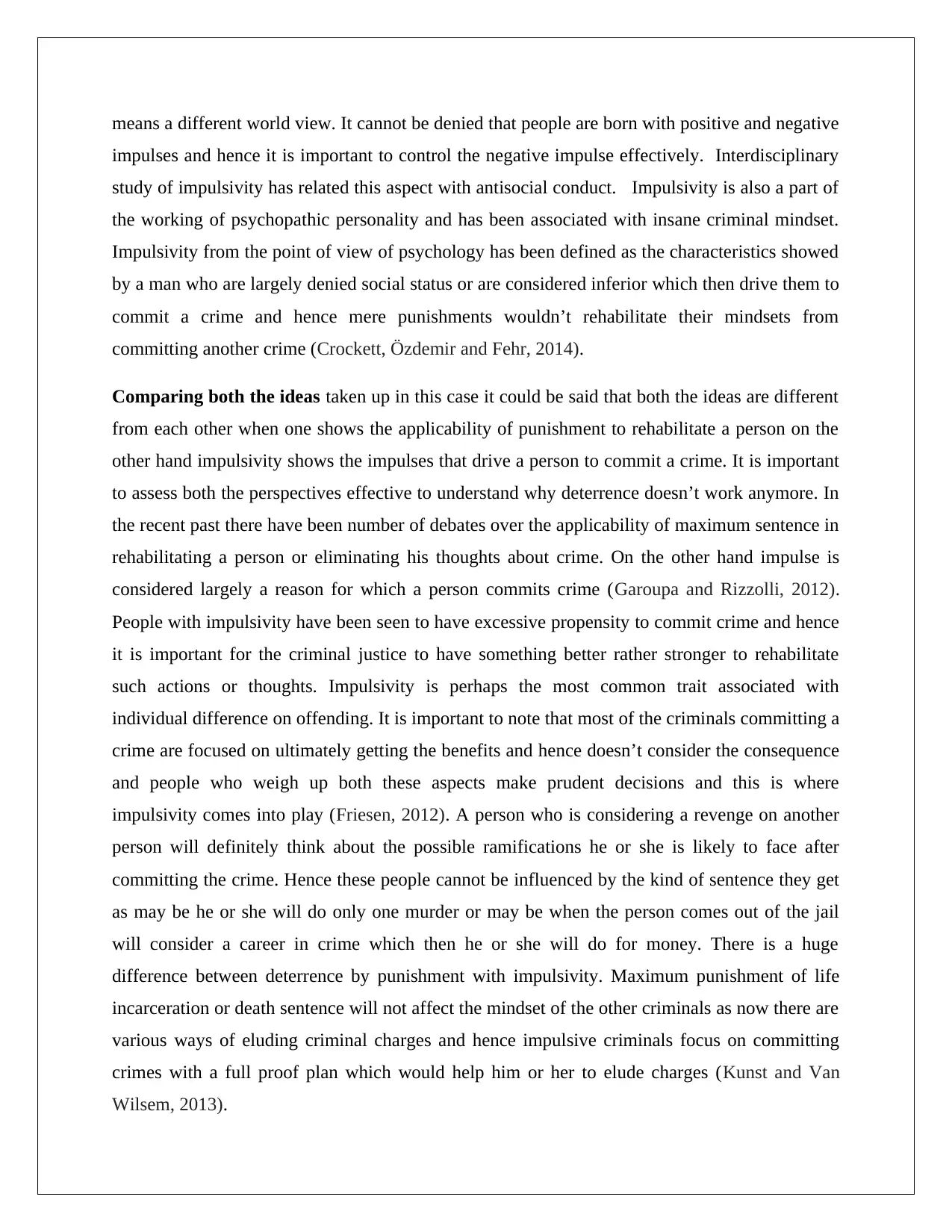
means a different world view. It cannot be denied that people are born with positive and negative
impulses and hence it is important to control the negative impulse effectively. Interdisciplinary
study of impulsivity has related this aspect with antisocial conduct. Impulsivity is also a part of
the working of psychopathic personality and has been associated with insane criminal mindset.
Impulsivity from the point of view of psychology has been defined as the characteristics showed
by a man who are largely denied social status or are considered inferior which then drive them to
commit a crime and hence mere punishments wouldn’t rehabilitate their mindsets from
committing another crime (Crockett, Özdemir and Fehr, 2014).
Comparing both the ideas taken up in this case it could be said that both the ideas are different
from each other when one shows the applicability of punishment to rehabilitate a person on the
other hand impulsivity shows the impulses that drive a person to commit a crime. It is important
to assess both the perspectives effective to understand why deterrence doesn’t work anymore. In
the recent past there have been number of debates over the applicability of maximum sentence in
rehabilitating a person or eliminating his thoughts about crime. On the other hand impulse is
considered largely a reason for which a person commits crime (Garoupa and Rizzolli, 2012).
People with impulsivity have been seen to have excessive propensity to commit crime and hence
it is important for the criminal justice to have something better rather stronger to rehabilitate
such actions or thoughts. Impulsivity is perhaps the most common trait associated with
individual difference on offending. It is important to note that most of the criminals committing a
crime are focused on ultimately getting the benefits and hence doesn’t consider the consequence
and people who weigh up both these aspects make prudent decisions and this is where
impulsivity comes into play (Friesen, 2012). A person who is considering a revenge on another
person will definitely think about the possible ramifications he or she is likely to face after
committing the crime. Hence these people cannot be influenced by the kind of sentence they get
as may be he or she will do only one murder or may be when the person comes out of the jail
will consider a career in crime which then he or she will do for money. There is a huge
difference between deterrence by punishment with impulsivity. Maximum punishment of life
incarceration or death sentence will not affect the mindset of the other criminals as now there are
various ways of eluding criminal charges and hence impulsive criminals focus on committing
crimes with a full proof plan which would help him or her to elude charges (Kunst and Van
Wilsem, 2013).
impulses and hence it is important to control the negative impulse effectively. Interdisciplinary
study of impulsivity has related this aspect with antisocial conduct. Impulsivity is also a part of
the working of psychopathic personality and has been associated with insane criminal mindset.
Impulsivity from the point of view of psychology has been defined as the characteristics showed
by a man who are largely denied social status or are considered inferior which then drive them to
commit a crime and hence mere punishments wouldn’t rehabilitate their mindsets from
committing another crime (Crockett, Özdemir and Fehr, 2014).
Comparing both the ideas taken up in this case it could be said that both the ideas are different
from each other when one shows the applicability of punishment to rehabilitate a person on the
other hand impulsivity shows the impulses that drive a person to commit a crime. It is important
to assess both the perspectives effective to understand why deterrence doesn’t work anymore. In
the recent past there have been number of debates over the applicability of maximum sentence in
rehabilitating a person or eliminating his thoughts about crime. On the other hand impulse is
considered largely a reason for which a person commits crime (Garoupa and Rizzolli, 2012).
People with impulsivity have been seen to have excessive propensity to commit crime and hence
it is important for the criminal justice to have something better rather stronger to rehabilitate
such actions or thoughts. Impulsivity is perhaps the most common trait associated with
individual difference on offending. It is important to note that most of the criminals committing a
crime are focused on ultimately getting the benefits and hence doesn’t consider the consequence
and people who weigh up both these aspects make prudent decisions and this is where
impulsivity comes into play (Friesen, 2012). A person who is considering a revenge on another
person will definitely think about the possible ramifications he or she is likely to face after
committing the crime. Hence these people cannot be influenced by the kind of sentence they get
as may be he or she will do only one murder or may be when the person comes out of the jail
will consider a career in crime which then he or she will do for money. There is a huge
difference between deterrence by punishment with impulsivity. Maximum punishment of life
incarceration or death sentence will not affect the mindset of the other criminals as now there are
various ways of eluding criminal charges and hence impulsive criminals focus on committing
crimes with a full proof plan which would help him or her to elude charges (Kunst and Van
Wilsem, 2013).
⊘ This is a preview!⊘
Do you want full access?
Subscribe today to unlock all pages.

Trusted by 1+ million students worldwide
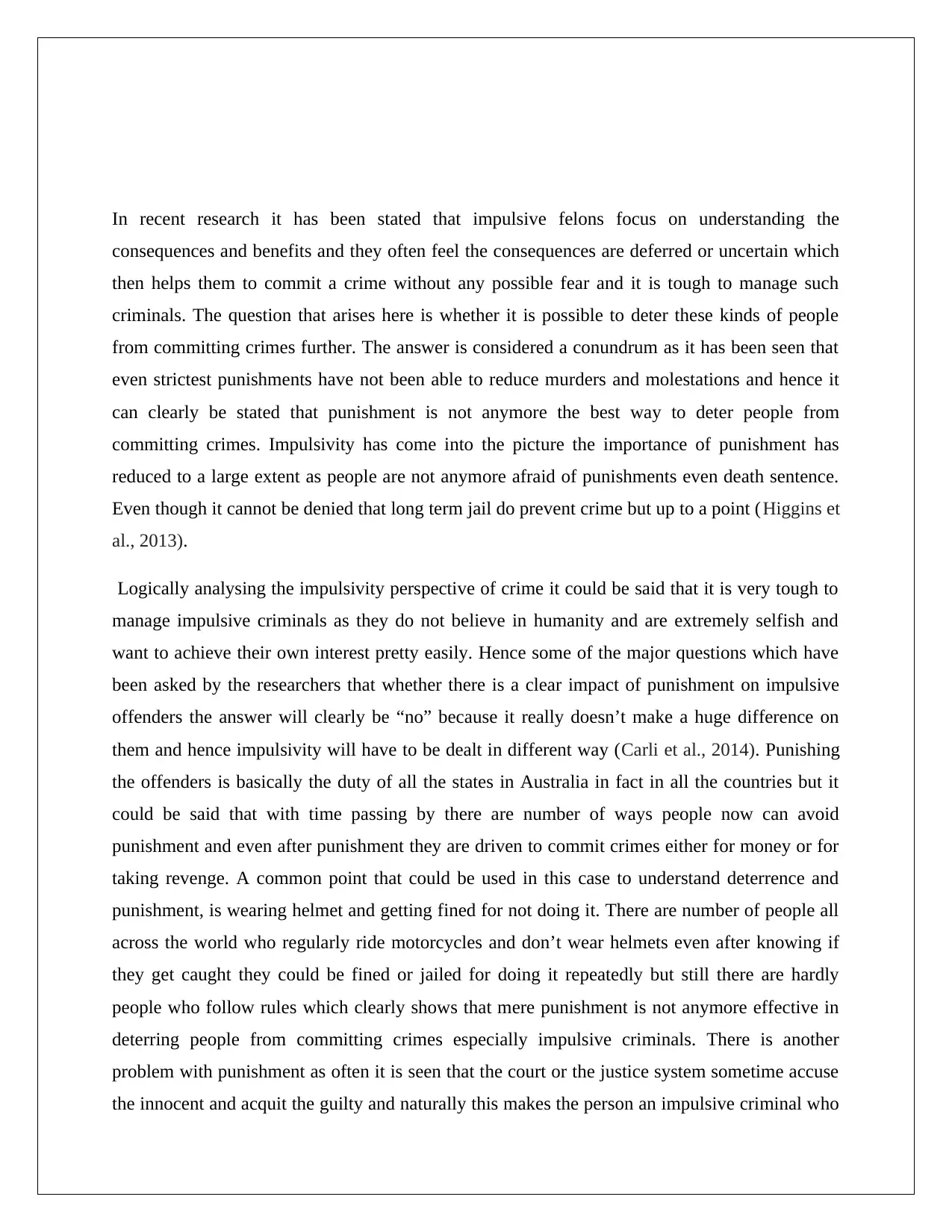
In recent research it has been stated that impulsive felons focus on understanding the
consequences and benefits and they often feel the consequences are deferred or uncertain which
then helps them to commit a crime without any possible fear and it is tough to manage such
criminals. The question that arises here is whether it is possible to deter these kinds of people
from committing crimes further. The answer is considered a conundrum as it has been seen that
even strictest punishments have not been able to reduce murders and molestations and hence it
can clearly be stated that punishment is not anymore the best way to deter people from
committing crimes. Impulsivity has come into the picture the importance of punishment has
reduced to a large extent as people are not anymore afraid of punishments even death sentence.
Even though it cannot be denied that long term jail do prevent crime but up to a point (Higgins et
al., 2013).
Logically analysing the impulsivity perspective of crime it could be said that it is very tough to
manage impulsive criminals as they do not believe in humanity and are extremely selfish and
want to achieve their own interest pretty easily. Hence some of the major questions which have
been asked by the researchers that whether there is a clear impact of punishment on impulsive
offenders the answer will clearly be “no” because it really doesn’t make a huge difference on
them and hence impulsivity will have to be dealt in different way (Carli et al., 2014). Punishing
the offenders is basically the duty of all the states in Australia in fact in all the countries but it
could be said that with time passing by there are number of ways people now can avoid
punishment and even after punishment they are driven to commit crimes either for money or for
taking revenge. A common point that could be used in this case to understand deterrence and
punishment, is wearing helmet and getting fined for not doing it. There are number of people all
across the world who regularly ride motorcycles and don’t wear helmets even after knowing if
they get caught they could be fined or jailed for doing it repeatedly but still there are hardly
people who follow rules which clearly shows that mere punishment is not anymore effective in
deterring people from committing crimes especially impulsive criminals. There is another
problem with punishment as often it is seen that the court or the justice system sometime accuse
the innocent and acquit the guilty and naturally this makes the person an impulsive criminal who
consequences and benefits and they often feel the consequences are deferred or uncertain which
then helps them to commit a crime without any possible fear and it is tough to manage such
criminals. The question that arises here is whether it is possible to deter these kinds of people
from committing crimes further. The answer is considered a conundrum as it has been seen that
even strictest punishments have not been able to reduce murders and molestations and hence it
can clearly be stated that punishment is not anymore the best way to deter people from
committing crimes. Impulsivity has come into the picture the importance of punishment has
reduced to a large extent as people are not anymore afraid of punishments even death sentence.
Even though it cannot be denied that long term jail do prevent crime but up to a point (Higgins et
al., 2013).
Logically analysing the impulsivity perspective of crime it could be said that it is very tough to
manage impulsive criminals as they do not believe in humanity and are extremely selfish and
want to achieve their own interest pretty easily. Hence some of the major questions which have
been asked by the researchers that whether there is a clear impact of punishment on impulsive
offenders the answer will clearly be “no” because it really doesn’t make a huge difference on
them and hence impulsivity will have to be dealt in different way (Carli et al., 2014). Punishing
the offenders is basically the duty of all the states in Australia in fact in all the countries but it
could be said that with time passing by there are number of ways people now can avoid
punishment and even after punishment they are driven to commit crimes either for money or for
taking revenge. A common point that could be used in this case to understand deterrence and
punishment, is wearing helmet and getting fined for not doing it. There are number of people all
across the world who regularly ride motorcycles and don’t wear helmets even after knowing if
they get caught they could be fined or jailed for doing it repeatedly but still there are hardly
people who follow rules which clearly shows that mere punishment is not anymore effective in
deterring people from committing crimes especially impulsive criminals. There is another
problem with punishment as often it is seen that the court or the justice system sometime accuse
the innocent and acquit the guilty and naturally this makes the person an impulsive criminal who
Paraphrase This Document
Need a fresh take? Get an instant paraphrase of this document with our AI Paraphraser
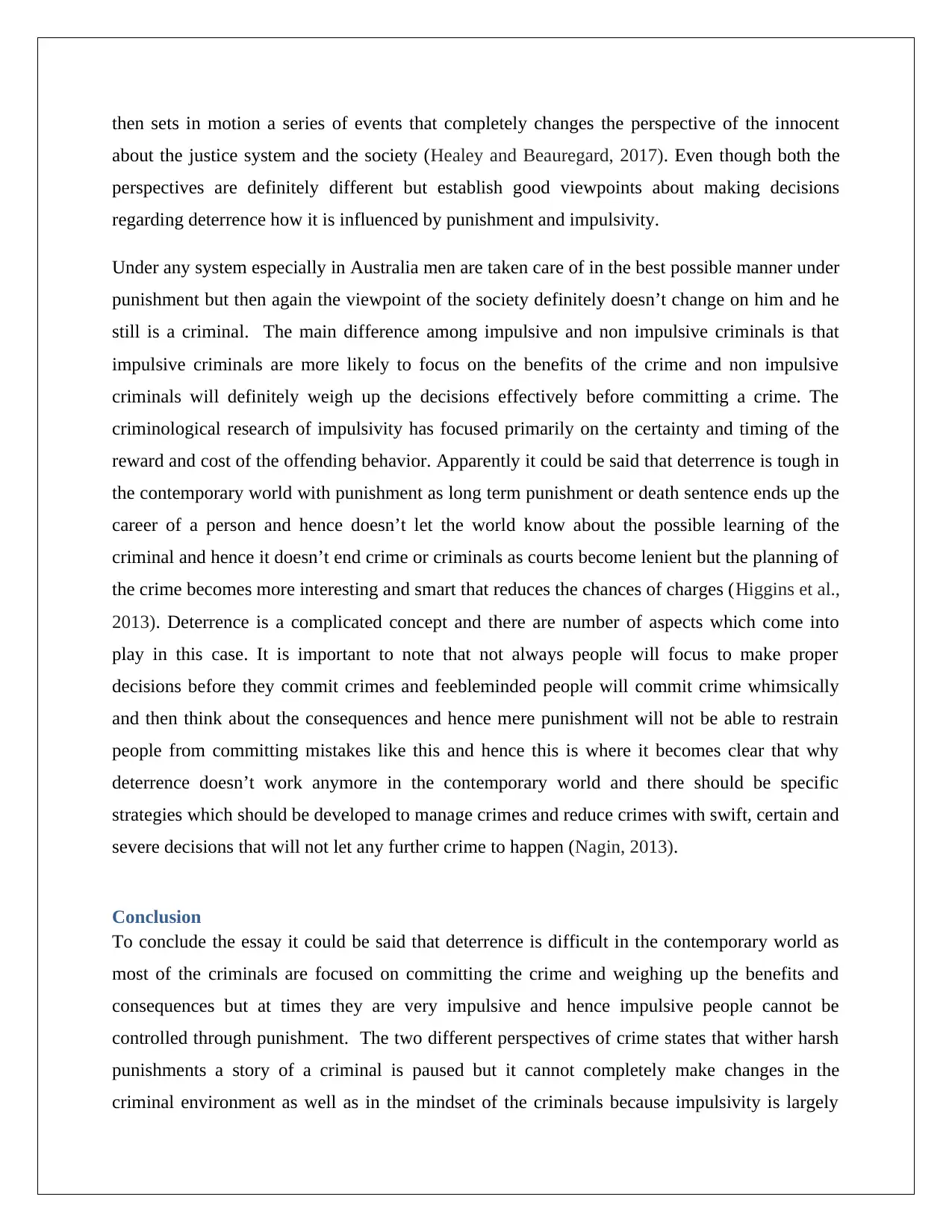
then sets in motion a series of events that completely changes the perspective of the innocent
about the justice system and the society (Healey and Beauregard, 2017). Even though both the
perspectives are definitely different but establish good viewpoints about making decisions
regarding deterrence how it is influenced by punishment and impulsivity.
Under any system especially in Australia men are taken care of in the best possible manner under
punishment but then again the viewpoint of the society definitely doesn’t change on him and he
still is a criminal. The main difference among impulsive and non impulsive criminals is that
impulsive criminals are more likely to focus on the benefits of the crime and non impulsive
criminals will definitely weigh up the decisions effectively before committing a crime. The
criminological research of impulsivity has focused primarily on the certainty and timing of the
reward and cost of the offending behavior. Apparently it could be said that deterrence is tough in
the contemporary world with punishment as long term punishment or death sentence ends up the
career of a person and hence doesn’t let the world know about the possible learning of the
criminal and hence it doesn’t end crime or criminals as courts become lenient but the planning of
the crime becomes more interesting and smart that reduces the chances of charges (Higgins et al.,
2013). Deterrence is a complicated concept and there are number of aspects which come into
play in this case. It is important to note that not always people will focus to make proper
decisions before they commit crimes and feebleminded people will commit crime whimsically
and then think about the consequences and hence mere punishment will not be able to restrain
people from committing mistakes like this and hence this is where it becomes clear that why
deterrence doesn’t work anymore in the contemporary world and there should be specific
strategies which should be developed to manage crimes and reduce crimes with swift, certain and
severe decisions that will not let any further crime to happen (Nagin, 2013).
Conclusion
To conclude the essay it could be said that deterrence is difficult in the contemporary world as
most of the criminals are focused on committing the crime and weighing up the benefits and
consequences but at times they are very impulsive and hence impulsive people cannot be
controlled through punishment. The two different perspectives of crime states that wither harsh
punishments a story of a criminal is paused but it cannot completely make changes in the
criminal environment as well as in the mindset of the criminals because impulsivity is largely
about the justice system and the society (Healey and Beauregard, 2017). Even though both the
perspectives are definitely different but establish good viewpoints about making decisions
regarding deterrence how it is influenced by punishment and impulsivity.
Under any system especially in Australia men are taken care of in the best possible manner under
punishment but then again the viewpoint of the society definitely doesn’t change on him and he
still is a criminal. The main difference among impulsive and non impulsive criminals is that
impulsive criminals are more likely to focus on the benefits of the crime and non impulsive
criminals will definitely weigh up the decisions effectively before committing a crime. The
criminological research of impulsivity has focused primarily on the certainty and timing of the
reward and cost of the offending behavior. Apparently it could be said that deterrence is tough in
the contemporary world with punishment as long term punishment or death sentence ends up the
career of a person and hence doesn’t let the world know about the possible learning of the
criminal and hence it doesn’t end crime or criminals as courts become lenient but the planning of
the crime becomes more interesting and smart that reduces the chances of charges (Higgins et al.,
2013). Deterrence is a complicated concept and there are number of aspects which come into
play in this case. It is important to note that not always people will focus to make proper
decisions before they commit crimes and feebleminded people will commit crime whimsically
and then think about the consequences and hence mere punishment will not be able to restrain
people from committing mistakes like this and hence this is where it becomes clear that why
deterrence doesn’t work anymore in the contemporary world and there should be specific
strategies which should be developed to manage crimes and reduce crimes with swift, certain and
severe decisions that will not let any further crime to happen (Nagin, 2013).
Conclusion
To conclude the essay it could be said that deterrence is difficult in the contemporary world as
most of the criminals are focused on committing the crime and weighing up the benefits and
consequences but at times they are very impulsive and hence impulsive people cannot be
controlled through punishment. The two different perspectives of crime states that wither harsh
punishments a story of a criminal is paused but it cannot completely make changes in the
criminal environment as well as in the mindset of the criminals because impulsivity is largely

related to criminality and hence it could be said that most of the criminals are impulsive and
focused on doing the crime for maximum benefits and they don’t think about punishment which
ultimately doesn’t lead to creation of awareness in the society and hence deterrence is not there.
Overall to conclude it could be said that deterrence doesn’t work anymore due to the increase in
impulsive offenders and with the decrease in the impact of punishments.
focused on doing the crime for maximum benefits and they don’t think about punishment which
ultimately doesn’t lead to creation of awareness in the society and hence deterrence is not there.
Overall to conclude it could be said that deterrence doesn’t work anymore due to the increase in
impulsive offenders and with the decrease in the impact of punishments.
⊘ This is a preview!⊘
Do you want full access?
Subscribe today to unlock all pages.

Trusted by 1+ million students worldwide
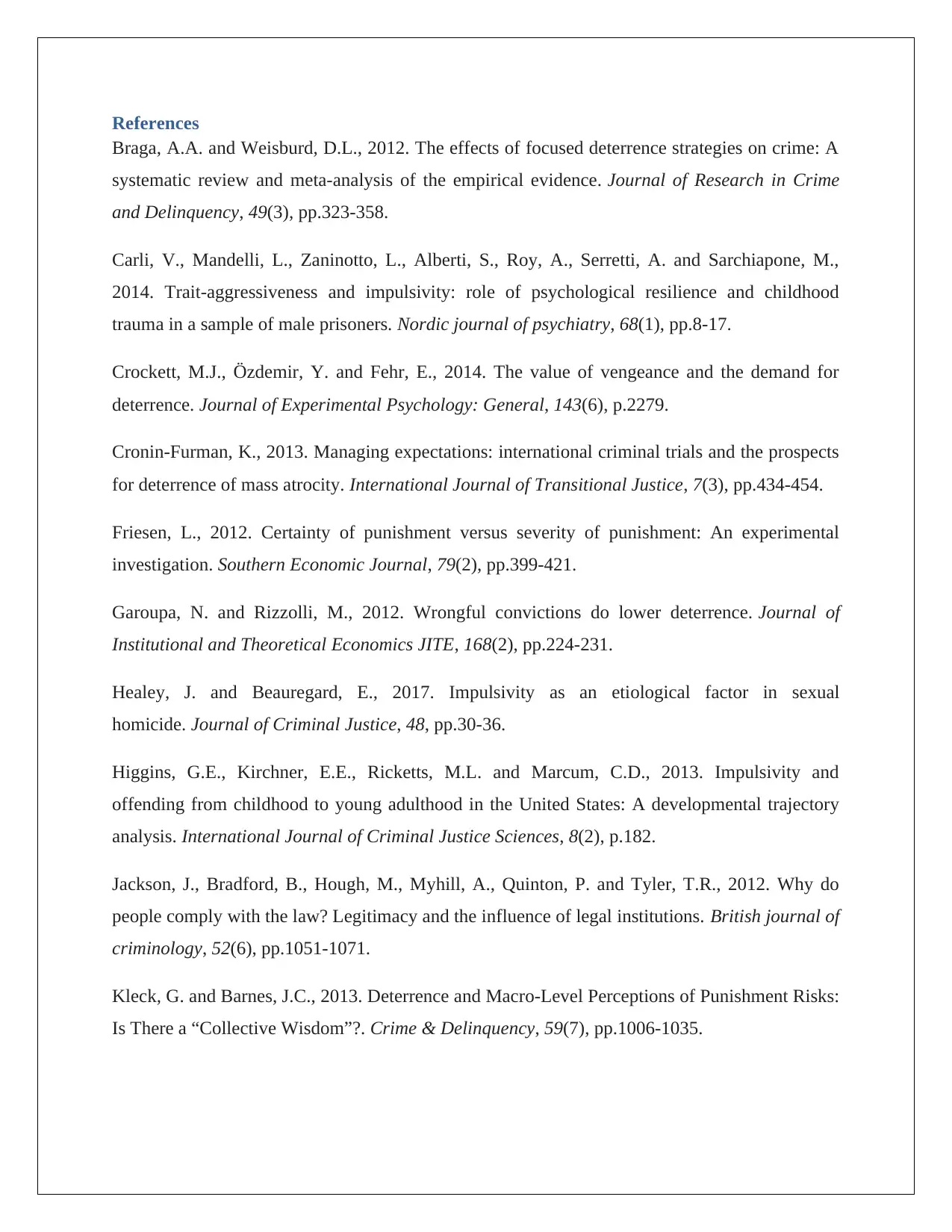
References
Braga, A.A. and Weisburd, D.L., 2012. The effects of focused deterrence strategies on crime: A
systematic review and meta-analysis of the empirical evidence. Journal of Research in Crime
and Delinquency, 49(3), pp.323-358.
Carli, V., Mandelli, L., Zaninotto, L., Alberti, S., Roy, A., Serretti, A. and Sarchiapone, M.,
2014. Trait-aggressiveness and impulsivity: role of psychological resilience and childhood
trauma in a sample of male prisoners. Nordic journal of psychiatry, 68(1), pp.8-17.
Crockett, M.J., Özdemir, Y. and Fehr, E., 2014. The value of vengeance and the demand for
deterrence. Journal of Experimental Psychology: General, 143(6), p.2279.
Cronin-Furman, K., 2013. Managing expectations: international criminal trials and the prospects
for deterrence of mass atrocity. International Journal of Transitional Justice, 7(3), pp.434-454.
Friesen, L., 2012. Certainty of punishment versus severity of punishment: An experimental
investigation. Southern Economic Journal, 79(2), pp.399-421.
Garoupa, N. and Rizzolli, M., 2012. Wrongful convictions do lower deterrence. Journal of
Institutional and Theoretical Economics JITE, 168(2), pp.224-231.
Healey, J. and Beauregard, E., 2017. Impulsivity as an etiological factor in sexual
homicide. Journal of Criminal Justice, 48, pp.30-36.
Higgins, G.E., Kirchner, E.E., Ricketts, M.L. and Marcum, C.D., 2013. Impulsivity and
offending from childhood to young adulthood in the United States: A developmental trajectory
analysis. International Journal of Criminal Justice Sciences, 8(2), p.182.
Jackson, J., Bradford, B., Hough, M., Myhill, A., Quinton, P. and Tyler, T.R., 2012. Why do
people comply with the law? Legitimacy and the influence of legal institutions. British journal of
criminology, 52(6), pp.1051-1071.
Kleck, G. and Barnes, J.C., 2013. Deterrence and Macro-Level Perceptions of Punishment Risks:
Is There a “Collective Wisdom”?. Crime & Delinquency, 59(7), pp.1006-1035.
Braga, A.A. and Weisburd, D.L., 2012. The effects of focused deterrence strategies on crime: A
systematic review and meta-analysis of the empirical evidence. Journal of Research in Crime
and Delinquency, 49(3), pp.323-358.
Carli, V., Mandelli, L., Zaninotto, L., Alberti, S., Roy, A., Serretti, A. and Sarchiapone, M.,
2014. Trait-aggressiveness and impulsivity: role of psychological resilience and childhood
trauma in a sample of male prisoners. Nordic journal of psychiatry, 68(1), pp.8-17.
Crockett, M.J., Özdemir, Y. and Fehr, E., 2014. The value of vengeance and the demand for
deterrence. Journal of Experimental Psychology: General, 143(6), p.2279.
Cronin-Furman, K., 2013. Managing expectations: international criminal trials and the prospects
for deterrence of mass atrocity. International Journal of Transitional Justice, 7(3), pp.434-454.
Friesen, L., 2012. Certainty of punishment versus severity of punishment: An experimental
investigation. Southern Economic Journal, 79(2), pp.399-421.
Garoupa, N. and Rizzolli, M., 2012. Wrongful convictions do lower deterrence. Journal of
Institutional and Theoretical Economics JITE, 168(2), pp.224-231.
Healey, J. and Beauregard, E., 2017. Impulsivity as an etiological factor in sexual
homicide. Journal of Criminal Justice, 48, pp.30-36.
Higgins, G.E., Kirchner, E.E., Ricketts, M.L. and Marcum, C.D., 2013. Impulsivity and
offending from childhood to young adulthood in the United States: A developmental trajectory
analysis. International Journal of Criminal Justice Sciences, 8(2), p.182.
Jackson, J., Bradford, B., Hough, M., Myhill, A., Quinton, P. and Tyler, T.R., 2012. Why do
people comply with the law? Legitimacy and the influence of legal institutions. British journal of
criminology, 52(6), pp.1051-1071.
Kleck, G. and Barnes, J.C., 2013. Deterrence and Macro-Level Perceptions of Punishment Risks:
Is There a “Collective Wisdom”?. Crime & Delinquency, 59(7), pp.1006-1035.
Paraphrase This Document
Need a fresh take? Get an instant paraphrase of this document with our AI Paraphraser

Kunst, M. and Van Wilsem, J., 2013. Trait impulsivity and change in mental health problems
after violent crime victimization: a prospective analysis of the Dutch Longitudinal Internet
Studies for the Social Sciences database. Journal of interpersonal violence, 28(8), pp.1642-1656.
Nagin, D.S., 2013. Deterrence in the twenty-first century. Crime and Justice, 42(1), pp.199-263.
Saridakis, G. and Spengler, H., 2012. Crime, deterrence and unemployment in Greece: A panel
data approach. The Social Science Journal, 49(2), pp.167-174.
Wellman, C.H., 2012. The rights forfeiture theory of punishment. Ethics, 122(2), pp.371-393.
Willison, R. and Warkentin, M., 2013. Beyond deterrence: An expanded view of employee
computer abuse. MIS quarterly, 37(1).
after violent crime victimization: a prospective analysis of the Dutch Longitudinal Internet
Studies for the Social Sciences database. Journal of interpersonal violence, 28(8), pp.1642-1656.
Nagin, D.S., 2013. Deterrence in the twenty-first century. Crime and Justice, 42(1), pp.199-263.
Saridakis, G. and Spengler, H., 2012. Crime, deterrence and unemployment in Greece: A panel
data approach. The Social Science Journal, 49(2), pp.167-174.
Wellman, C.H., 2012. The rights forfeiture theory of punishment. Ethics, 122(2), pp.371-393.
Willison, R. and Warkentin, M., 2013. Beyond deterrence: An expanded view of employee
computer abuse. MIS quarterly, 37(1).
1 out of 11
Related Documents
Your All-in-One AI-Powered Toolkit for Academic Success.
+13062052269
info@desklib.com
Available 24*7 on WhatsApp / Email
![[object Object]](/_next/static/media/star-bottom.7253800d.svg)
Unlock your academic potential
Copyright © 2020–2026 A2Z Services. All Rights Reserved. Developed and managed by ZUCOL.





